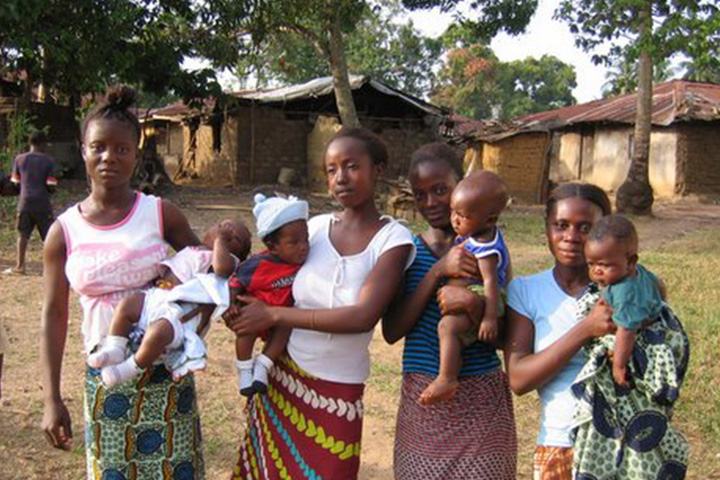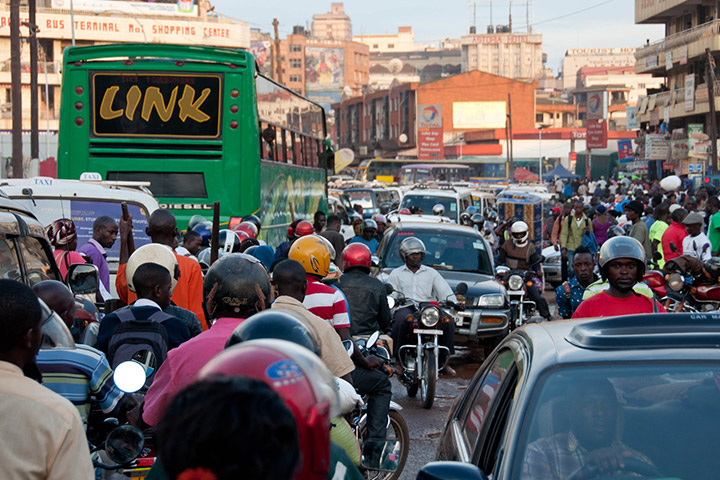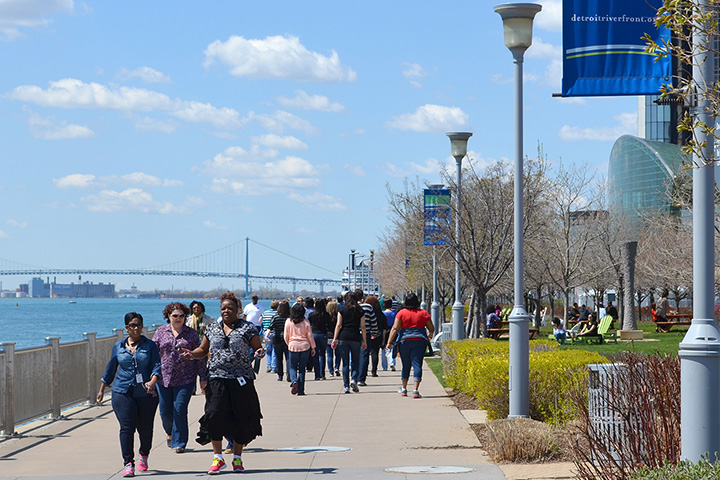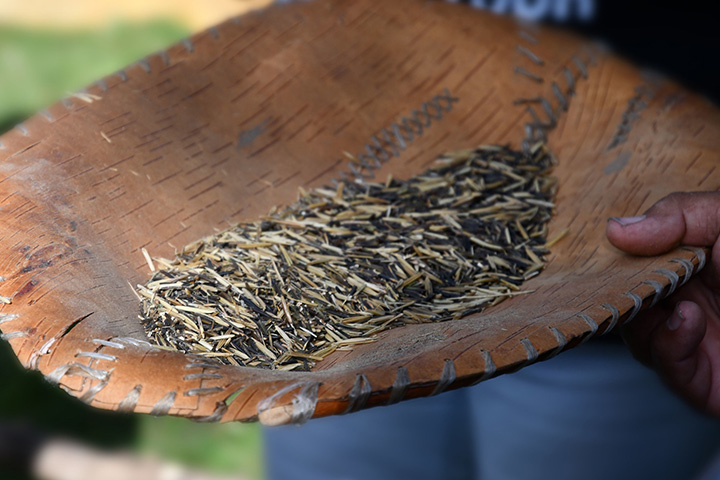Winnowing the rice. Wild Rice Initiative | Photo credit: Todd Marsee, Michigan Sea Grant.
From beetles to bikes, the four projects newly funded by the Graham Sustainability Institute’s catalyst grant program run the gamut but share a purpose: to apply faculty expertise to solve real-world challenges, co-creating the solutions with those who will use them.
These interdisciplinary projects are the latest in a long line of Graham Institute catalyst grant winners that since the program’s inception in 2017 have aimed to build new partnerships and enhance the application of science. Every catalyst grant project engages an external partner in a position to put the project’s outputs to use.
“Our research and the tools we provide (our partners) for their own use can help guide their operations and investments for years to come,” said Michael Craig, associate professor of energy systems at the School for Environment and Sustainability and principal investigator of a project that will begin to quantify the emission benefits of electrifying motorcycle taxi fleets in sub-Saharan Africa.
"Many cities in low- and middle-income countries face the challenge of continuing to develop and improving their citizens’ lives, while also grappling with greenhouse gas and local pollution. We plan to apply the methods and tools we create… to other countries with subsequent funding from governmental or non-profit organizations."
Other projects include creating a sustainable source of nutrition for expectant mothers in Liberia, developing tools to promote justice and equity in urban climate adaptation plans, and assessing the feasibility of wild rice restoration on U-M lands in partnership with tribal nations and other stakeholders.
Jody Lori, professor and associate dean for global affairs at the School of Nursing, who is principal investigator of the sustainable nutrition project, said, “Community members got me interested in thinking of innovative ways to address this real issue of food security and the idea (for the project) just came together.”
“It’s exciting to work with communities for long term impact,” said Lori. “Once women have the knowledge and tools on a new and novel approach to generate food and income, I think the project has great potential for long-term sustainability.”
Graham Institute catalyst grants are open to all faculty and researchers across U-M’s three campuses. The four featured projects were selected from among 11 proposed this cycle. Each research team will receive $10,000 in funding.
To learn more, read on and visit the project web pages linked below.
Palm Weevils Could Nourish Expectant Mothers, Provide Revenue to Health Care Facilities

Liberian women in the late stages of pregnancy can stay at maternity waiting houses (MWHs) to receive skilled obstetric care through childbirth, but many choose not to use this service because of a lack of access to food. Partnering with Ghana-based AnePaare Farms and Liberian Bong County Health Team, this team will bring a low-carbon, sustainable food source to six of Liberia’s 114 MWHs by cultivating edible insects (Liberian African palm weevil larva) on site.
The team and partners will train three midwives and three traditional birth attendants from the MWHs in rural Bong County to rear the palm weevils using the company’s “rearing kits,” which include simple tools like a bucket and a mesh screen. Trainees will also learn to harvest and process the palm weevil larvae into food powder, cubes, protein bars, pies, and cakes.
The insects will provide sustainable, protein-rich nutrition for pregnant women at MWHs, and their cultivation may serve as an income-generating activity for the facilities (provided the bugs can be commercially harvested). The team hopes to extend the project to all of Liberia’s MWHs.
- Project team: Jody Lori, PI (U-M Nursing), Cheryl Moyer (U-M Medicine), Jacob Anakware (AnePaare Farms founder and CEO), Alphonso Kofa (Bong County Health Team director), Barsee Zogbaye (Bong County Health Team), Aloysium Nyanplu (Bong County Health Team)
How Much Will Electrifying Motorcycle Taxi Fleets in Uganda Help Human Health and Reduce Emissions?

Rapidly urbanizing cities across low and middle-income countries suffer from poor air quality, which contributes to morbidity and mortality. In these cities, transportation fleets are major emitters of local air pollutants and often include hundreds of thousands of fossil-fueled motorcycles.
Companies like Zembo (est. 2017) have begun to deploy electric motorcycles to yield social and environmental benefits, including improved air quality and health outcomes. Working closely with Zembo, this project team will develop a modeling framework to estimate the emission benefits of the company’s operations, as well as the benefits that would come from a widespread shift to electric motorcycles across Kampala, Uganda, where Zembo is headquartered.
Focusing on the transition from fossil fuel to electric motorcycles, the project team will analyze five factors: motorcycle technology, electricity sources, vehicle emissions, transportation infrastructure, and travel considerations (daily trips, traffic, and charging/fueling needs). Understanding the emission-savings potential of each of these factors could yield large, diverse benefits in across Sub-Saharan Africa, home to over 1 billion people.
- Project team: Michael Craig, PI (U-M SEAS), Pam Jagger (U-M SEAS), Herek Clack (U-M Civil and Environmental Engineering), Étienne Saint-Sernin (Zembo co-founder), Daniel Dreher (Zembo co-founder), Thomas Courtright (U-M SEAS/TCAUP), Jacob Calzavara (U-M Erb Institute), Junghoon Park (U-M Erb Institute)
New Tools Will Promote Justice and Equity in Climate Adaptation Plans

Cities nationwide are developing broad, ambitious plans to adapt to climate change, and a growing number have begun to recognize the particular vulnerabilities of low-income and racialized groups. But incorporating justice and equity into their adaptation planning—though critically important—is a challenge: The guidelines, frameworks, and metrics needed for a justice-centered approach are not readily available to practitioners.
This project will help fill that gap with two important outputs: a report that introduces decision-makers to the considerations involved in developing a justice-oriented adaptation plan, and a public resource guide for cities addressing justice in their adaptation planning. Using these tools, practitioners will be in a better position to develop adaptation strategies that account for the needs of the most vulnerable urban residents and reduce existing inequities.
-
Project team: Sara Hughes, PI (SEAS); Richard Norton (TCAUP), Sarah Dobie (TCAUP), Kirsten Schwartz (UCLA Luskin), Kelly Turner (UCLA Luskin), Joyce Coffee (Climate Resilience Consulting), Madeleine Lane (SEAS)
-
Partners: Detroit Office of Sustainability, Urban Sustainability Directors Network
Restoring Mnomen, a Step on the Path to Reconciliation

Although mistaken for a wetland plant of only the far north, Mnomen (wild rice, Zizania aquatica; Z. palustris) is a staple food for Anishinaabek peoples across the Great Lakes—including those who once made their home on lands now owned by U-M. But after centuries of ecological degradation across Michigan’s lower peninsula, Mnomen now survives in just a fraction of its former abundance.
This project—called the Mnomen Initiative—aims to build a partnership of Anishinaabek community members, tribal nations, U-M faculty, and allies at other Michigan universities. Tribal partners will contribute time-tested traditional ecological knowledge and years of hard-earned experience in Mnomen socio-ecology, while regional wild rice experts will bring the range of available current knowledge and best practices. Together, the group will assess the feasibility of Mnomen restoration on ten U-M properties and propose a pilot restoration project on the most appropriate site, exemplifying sustainability grounded in reconciliation principles.
- Project team: David Michener, PI (U-M Botanical Gardens), Rebecca Hardin (U-M SEAS), Gregory Dowd (U-M LSA), Benjamin Secunda (UMOR), Scott Herron (Ferris State University), Samantha Stokes (U-M SEAS), Maeghen Goode (U-M SEAS/TCAUP), Manavi Jaluka (Vassar University), Doug Taylor (Nottawaseppi Huron Band of Potawatomi), John Rodwan (Nottawaseppi Huron Band of Potawatomi), Eric Kerney (Nottawaseppi Huron Band of Potawatomi), Gary Morseau (Pokagon Band of Potawatomi), Marcus Winchester (Pokagon Band of Potawatomi), Christine Morseau (Pokagon Band of Potawatomi), Shannon Martin (Saginaw Chippewa Indian Tribe), Carey Pauquette (Saginaw Chippewa Indian Tribe), Kathy Hart (Saginaw Chippewa Tribal College), William Johnson (Michigan Anishinaabe Cultural and Repatriation Alliance), Alex Wieten (Match-E-Be-Nash-She-Wish (Gun Lake) Band of Potawatomi Indians), Montana Riley (Walpole Island Cultural Center), Roger Labine (Lac Vieux Desert), Ricki Oldencamp (Pierce Cedar Creek Institute), Corey Lucas (Pierce Cedar Creek Institute), Barb Barton (author of Manoomin: The Story of Wild Rice in Michigan)
For more information on the Graham Sustainability Institute's catalyst grant program, contact Maggie Allan at [email protected].